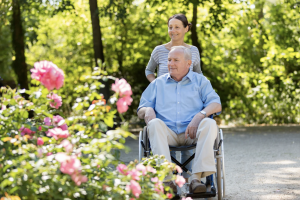Recognizing Early Signs of Alzheimer's
Alzheimer’s is a brain disease that causes memory and thinking skills to decline over time. It can be difficult to identify whether someone is showing signs of it. However, there are a number of ways to identify symptoms early on. With that in mind, let us take a look at the 5 early signs of Alzheimer’s.
Memory Loss
First and foremost, memory loss is an early sign. Specifically, this deals with memory loss that interrupts daily life. This includes asking the same questions over and over, forgetting events and dates, and more. Essentially, if they are having trouble remembering things they normally did not need help with it can be considered an early sign of Alzheimer’s.
Trouble Speaking Or Writing
Another early sign may also be trouble conversing. As a result, they may struggle finding the right word. Additionally, joining and keeping caught up in a conversation can be difficult.
Misplacing Things & Problems Retracing Steps
A person with the early signs of Alzheimer’s will often place things in unusual places. Consequently, they struggle to remember where they placed them. Finally, it becomes difficult for them to retrace their steps and figure out where those items might be.
Decreased Judgement & Reasoning Skills
Decision-making can be a challenge and an early sign of Alzheimer’s. The person may show a lack of attention when dealing with money, hygiene, and more. Essentially, their judgement and reasoning skills will start to falter.
Changes In Mood & Withdrawal
A person with the early signs of Alzheimer’s may experience a change in their mood and personality. As a result, they may become depressed, anxious, or confused. Additionally, this can cause them to withdraw socially as they have trouble emotionally and conversationally.
Quality Of Life You Can’t Find Anywhere Else
At Courtyard Manor, we understand memory issues affect the entire family. That’s why we offer 24-hour on-floor nursing care. We give your loved ones quality of life and compassion you cannot find anywhere else. Are you ready to give yourself and your loved ones the peace of mind they deserve? Contact us today.
Reach Out To Us

How to Talk with a Parent About Moving Into Assisted Living
Guidance for Meaningful Conversations Conversations about assisted living are never easy. For many families, the topic comes up when health and daily living needs begin

Integrating Physical and Behavioral Health in Senior Living
Whole-Person Care for Seniors In senior living communities, quality care means looking beyond the immediate physical needs of residents. True wellness requires an integrated approach

Supporting Cognitive Health in Assisted Living
Daily Enrichment for Seniors As we age, maintaining cognitive health becomes just as essential as caring for our physical well-being. Cognitive decline doesn’t happen overnight—it’s

